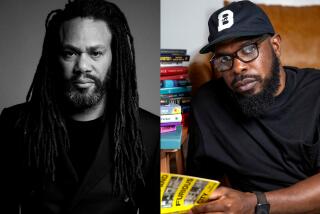E-Book Publishing: Much Ado About Nothing Much?
- Share via
Stephen King, who in March became the first author to pen a best-selling electronic book, will make another bold step today by selling the first 10,000 words of a suspense tale called “The Plant” on his Web site.
This time King is going it alone, forsaking bookstores, online retailers and even his longtime publisher, Simon & Schuster, which sold half a million encrypted copies of his previous e-book, “Riding the Bullet.”
King is asking readers to send $1 each time they download, an experiment to see whether the honor system can trump the Internet urge to pirate.
The effort is another sign of the building enthusiasm for electronic publishing. Unlike the recording industry, which has fought rear-guard legal battles against Napster, MP3.com and other online technologies that spread pirated music, the big New York publishing houses have been investing rapidly in new e-book companies and joint ventures.
Yet for all the ink getting spilled about e-books, almost no one is making money.
And King’s latest move shows how precarious the old industry’s plans are. As he wrote recently on his https://www.stephenking.com site: “My friends, we have a chance to become Big Publishing’s worst nightmare.”
King will end the project “if we find that the number of downloads is out of proportion to the amount of payments,” said his assistant, Marsha DeFilippo. Should King receive checks for fewer than 3 of 4 downloads, he’ll halt the e-book installments.
King’s fame makes him something of a special case. But a lot of publishing profits come from the biggest names, and there are other signs of an e-book reality sharply at odds with the barrage of e-hype.
Simon & Schuster recently tried to get a number of its authors, including such well-known figures as gonzo journalist Hunter Thompson and New Yorker legal writer Jeffrey Toobin, to provide 15,000 words of original material for electronic distribution.
In return, the publisher offered underwhelming advances of as little as $1,000, a figure that speaks volumes about what the company believes about potential sales. Thompson and Toobin declined.
“What we’re talking about is basically a very small market,” said Simon & Schuster spokesman Adam Rothberg. “We’re trying to expand the market here. They [the authors] need to do their part as well.”
Except for King, the best-selling e-books to date haven’t topped 1,000 copies, Rothberg said.
That hasn’t stopped a string of hasty May-December marriages between the Web world and the $20-billion book industry.
* In April, Random House bought a major stake in Philadelphia-based Xlibris.com, which helps authors self-publish electronic books and those that can be printed on demand.
* A few weeks later, Time Warner said it will open a division called iPublish next year, devoting it to converting existing books to electronic form and to posting new submissions from the public.
* And this month, Simon & Schuster announced a deal to make thousands of its backlisted titles available through a company called Lightning Source, which already sells 10,000 titles electronically or as print-on-demand books.
“The best-case scenario is that e-books have the same impact as paperbacks did in the ‘60s and ‘70,” said Simon & Schuster President Jack Romanos, who believes electronic publishing will generate $2.3-billion in annual revenue five years from now, or about 10% of industry sales.
Book retailers are also beginning to re-align themselves.
Amazon.com has a deal to distribute Lightning Source books. Barnesandnoble.com, itself begat not all that long ago by Barnes & Noble, in June plunked down $20 million for a piece of MightyWords, which offers a pay-per-download service.
And Steven Brill, founder of American Lawyer and Brill’s Content magazines, this month announced a similar combination site, Contentville, that will sell traditional books and also charge for downloads of magazine articles, speeches and the like.
But it still looks to some industry experts like much ado about not very much.
King’s Online Success Can Be Misleading
Take the truth about King, the e-book industry’s one runaway hit:
Back in March, Simon & Schuster said it had distributed 500,000 electronic copies of “Riding the Bullet” at $2.50 apiece, 10 times its rosiest circulation projection.
But Amazon and Barnesandnoble.com purchased the vast majority of those copies and gave them away. And much of the massive distribution consisted of people experimenting to see whether the process worked, experts say.
In fact, only 1% of those who downloaded King’s first e-book actually read it, according to Carol Fitzgerald, chief executive of the Book Report Network, a set of Web sites about publishing. Fitzgerald gave that estimate after tallying 3,000 survey responses from her newsletter readers who downloaded the 66-page novella.
If her sample is accurate--and Simon & Schuster disputes it--that means only 5,000 people read King’s work.
One part of e-publishing’s problem is the hardware: The technology for new hand-held reading devices is still evolving and has a long way to go before many people see a need to abandon the old-fashioned book, which is portable, efficient and readable.
“No reader is asking for e-books,” Fitzgerald said. “This is not the Sony Walkman.”
NuvoMedia and SoftBook Press, both bought recently by Pasadena-based Gemstar International, have sold fewer than 50,000 of their e-book reading devices combined, analysts say.
And although Microsoft has been improving its software to make electronic text easier on the eyes, reading in front of a regular computer gets old quickly.
That’s the main reason e-publishing sales, especially those that prevent user printing, have lagged print-on-demand.
Even if that should turn around, it won’t all be to big publishing’s benefit.
If King’s honesty gambit, which does allow user printing, is a success, many more do-it-yourself e-blockbusters could be on the way.
Smaller Names Finding Benefits on the Web
The Web also favors those at the other extreme--smaller names that can’t get traditional publishing contracts, or contracts that pay enough to live on.
That’s what happened with Melisse Shapiro, who writes electronic news and fiction under the name M.J. Rose. Shapiro became a Web phenomenon after her erotic novel “Lip Service” was turned down by New York publishers. She turned to the Web, striking it so big that her book was not only picked up by a traditional publisher but became a book-club selection.
Now Shapiro is playing to both audiences, with a conventional book contract and a five-figure advance for an e-novella to be posted on MightyWords.
The people who will benefit most from traditional publishing, however, will be writers in the middle of the pack, who want marketing muscle, distribution and editing.
More than 90% of books are still sold in stores, and it’s the big publishers that can get books on those shelves.
The most likely outcome is that electronic rights will become a negotiated part of every package. Big publishers don’t want to promote authors only to see them keep all the electronic profits. But authors might get to keep a higher percentage of e-book sales as royalties because production costs are so much lower.
Until it all gets sorted out, those who have the most success without old-school help might be those who take the constantly buzzing, self-referential Web as both their medium and their message.
That tack is working for Salon.com technology writer Andrew Leonard, who was turned down by most big publishers when he wanted to write about Linux, the upstart computer-operating system.
Instead, his online magazine made the book a kind of open-source effort. Leonard is posting chapters to Salon’s Web site as he finishes them, allowing them to be printed freely and inviting feedback.
Leonard says his work-in-progress is now driving thousands of Salon page-views. “I’m relieved we haven’t gone the traditional route,” Leonard said.
Yet the best news for him may be the renewed demand from the old world: Now that the buzz is out there, he said, “real publishers want to publish it.”
More to Read
Sign up for our Book Club newsletter
Get the latest news, events and more from the Los Angeles Times Book Club, and help us get L.A. reading and talking.
You may occasionally receive promotional content from the Los Angeles Times.










